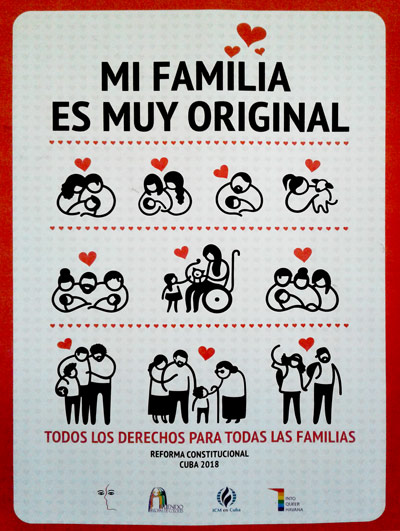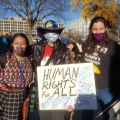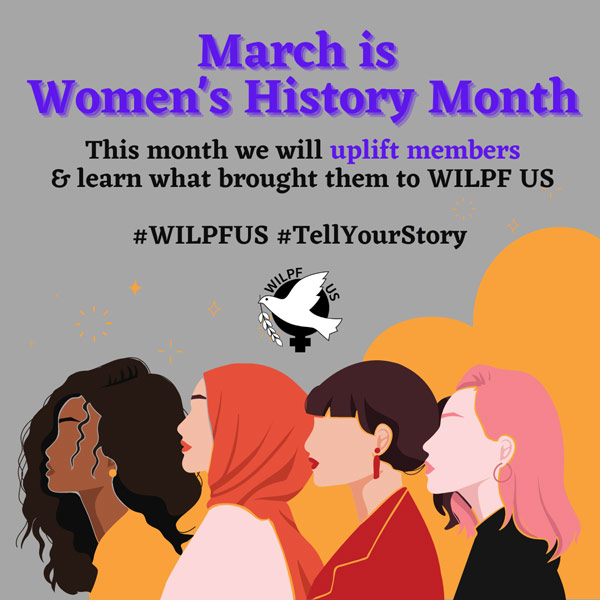By Leni Villagomez Reeves
April 2022
Cuba finished writing and approving, by referendum, a new constitution in 2019. Now, Cuba is creating a legal code that details the rights set forth in the new constitution. The previous Cuban constitution was written in 1975. It was an advanced document for its time, especially regarding women’s rights, but it included prevalent assumptions about heteronormativity and patriarchal authoritarian family structure.
In the new constitution, the most controversial area was marriage rights for anyone other than heterosexual couples. This version was adopted: “All persons have the right to establish a family… Marriage is a social and juridical (legal) institution. It is one of the forms by which families can organize. It is founded in the free consent and the equality of rights, obligations, and legal capabilities of the two spouses.”
All the Rights for All the Families
 The Families Code is the name of this set of laws. Codigo de Las Familias, in Spanish — a recognition of plurality — families, rather than a single model. This proposed set of laws has over 400 articles, protecting the rights of all people to form a family without discrimination, updating the legal definitions with inclusive models, establishing the right to a family life free from violence, and centering values of love, affection, solidarity, and responsibility.
The Families Code is the name of this set of laws. Codigo de Las Familias, in Spanish — a recognition of plurality — families, rather than a single model. This proposed set of laws has over 400 articles, protecting the rights of all people to form a family without discrimination, updating the legal definitions with inclusive models, establishing the right to a family life free from violence, and centering values of love, affection, solidarity, and responsibility.
Yes, it will recognize same-sex marriage. “Marriage is the voluntary union of two people on the basis of affection, love, and mutual respect.” Now let’s consider other aspects of what is truly revolutionary in the proposed new Families Code of Cuba, currently in the process of consultation with the people.
Real Consultation with the People
That’s part of what’s revolutionary — a serious consultation process involving about 78,000 meetings in electoral precincts in every neighborhood. The new laws establish rights not recognized until now in the legal system. The process pushes the limits of the possible both in organization and in conception. People have to work through revolutionary changes. In May, Cuba’s Parliament, the Asamblea de Poder Popular, will approve a new version of the text with inputs from the public consultation. After that, the Families Code goes to a popular referendum.
Getting it Right
The process of consultation and referendum is true participatory democracy. A variety of opinions enriches the discussion. It works best when there is no manipulation of people’s fears and prejudices by those who either wish to promote their own beliefs or wish to destabilize Cuba. Some of those in opposition have attempted to pick out sensitive issues and then pervert the dialogue by distorting these issues. A Cuban saying is “La mentira tiene patas cortas” — lies have short legs — but social media, especially when used by professional manipulators, has given some lies long strides. Here are some lies or distortions contrasted with reality:
Falsehood: Parental authority is replaced by parental responsibility, which means parents will lose control of their children or legal rights to them.
Reality: The Families Code replaces the term authority with the term responsibility, but this does not remove parental rights. Parents retain all rights and responsibilities, except in sharply defined circumstances where a parent is harming the child, as in physical or sexual abuse. The State does not take over any parental authority.
Falsehood: The State is going to take over the children. The slogan associated with this myth: Children belong to their parents, not the state.
Reality: Children belong with their family and in that sense of “belong to their family,” there is no dispute or change in the law, but they are not possessions in the sense of “I can do whatever I want with him - or more often her - because she’s mine.” Parents must care for and protect their children. Only if they fail to do so must the state intervene in the best interests of the child.
Falsehood: Courts will be able to allow the marriage of minors without parental consent.
Reality: Just the opposite. The current set of laws allows parents and guardians to consent to marriage of girls at 14, boys at 16 under exceptional circumstances. The new Families Code prohibits the marriage of minors (under 18). Not with the consent of parents. Not by court order. Not at all.
Falsehood: The concept of progressive autonomy for children will allow children to make inappropriate decisions. (The religious right often focuses on fears of children making decisions about gender identity.) Reality: Sex change for minors isn’t allowed. Whether or not we disagree with this model, Cuba does not allow minors to make major decisions involving surgery or hormone treatment before legal adulthood at 18. And progressive autonomy means that children have rights and that they can exercise these rights according to their level of maturity, assuming new decision-making powers appropriate to their development. At the same time, parents continue to make decisions for the child in accord with the child’s highest interests, considering the child’s character and preferences, during the process of maturation.
Falsehood: Surrogate pregnancy legalization means women can carry a pregnancy for pay.
Reality: Surrogate pregnancy is legalized, but it must be done for love.
Falsehood: People of the same sex can marry, and that’s a bad idea.
Reality: People can marry whom they choose, and that’s a great idea.
The Opposition
 On one side of the discussion is an organized conservative political force centered around evangelical churches, many of them with strong ties to the conservative evangelical churches and political movements in the US, which help finance them. They insist on their presumed biblical mandates on marriage, but it’s far more than that; there’s a marked authoritarian and patriarchal attitude regarding all family structures. They want to have “custody over” rather than “responsibility for” children, with children regarded as possessions within the family structure. They want to keep the option of physical and psychological violence within the family.
On one side of the discussion is an organized conservative political force centered around evangelical churches, many of them with strong ties to the conservative evangelical churches and political movements in the US, which help finance them. They insist on their presumed biblical mandates on marriage, but it’s far more than that; there’s a marked authoritarian and patriarchal attitude regarding all family structures. They want to have “custody over” rather than “responsibility for” children, with children regarded as possessions within the family structure. They want to keep the option of physical and psychological violence within the family.
The Coalition of Those For Inclusivity and Justice
It’s important to note that this is “not all churches.” A liberation theology ecumenical religious movement in Cuba is also represented in this discussion, part of the coalition advocating for diversity, rights, and dignity, upholding this Families Code as a document consistent with a biblical message of full dignity and rights for all.
They are part of a broad coalition of organizations and activists for diversity, inclusiveness, feminism, a dismantling of patriarchy, and a redefinition of family, with the widening of the concept of family beyond consanguinity to open it to relationships that are built on love, affection, and solidarity. This view promotes equity and justice as root values and extends additional legal rights and autonomy to the elderly, to children, and people with incapacities and disabilities.
The Cuban Revolution, acting with integrity, cannot bargain away the rights of any sector of the people to conform to popular or religious prejudice. Back when the California Fair Housing Act was being considered in 1959, some white people used to think and say that a good argument against laws prohibiting discrimination was “You can’t legislate how people feel.” The answer is that you certainly can legislate how they act. Cuba is uniquely trying to educate in the process of legislating, but All The Rights for All The Families is ultimately not negotiable.
 In recent months, the Greater Philadelphia Branch has been active in the community, participating in the Poor People’s Rally in Washington D.C. on December 13 and showing up for Democracy at one of the street actions on the anniversary of the January 6 attack on the US Capitol.
In recent months, the Greater Philadelphia Branch has been active in the community, participating in the Poor People’s Rally in Washington D.C. on December 13 and showing up for Democracy at one of the street actions on the anniversary of the January 6 attack on the US Capitol.




 The Families Code is the name of this set of laws. Codigo de Las Familias, in Spanish — a recognition of plurality — families, rather than a single model. This proposed set of laws has over 400 articles, protecting the rights of all people to form a family without discrimination, updating the legal definitions with inclusive models, establishing the right to a family life free from violence, and centering values of love, affection, solidarity, and responsibility.
The Families Code is the name of this set of laws. Codigo de Las Familias, in Spanish — a recognition of plurality — families, rather than a single model. This proposed set of laws has over 400 articles, protecting the rights of all people to form a family without discrimination, updating the legal definitions with inclusive models, establishing the right to a family life free from violence, and centering values of love, affection, solidarity, and responsibility. On one side of the discussion is an organized conservative political force centered around evangelical churches, many of them with strong ties to the conservative evangelical churches and political movements in the US, which help finance them. They insist on their presumed biblical mandates on marriage, but it’s far more than that; there’s a marked authoritarian and patriarchal attitude regarding all family structures. They want to have “custody over” rather than “responsibility for” children, with children regarded as possessions within the family structure. They want to keep the option of physical and psychological violence within the family.
On one side of the discussion is an organized conservative political force centered around evangelical churches, many of them with strong ties to the conservative evangelical churches and political movements in the US, which help finance them. They insist on their presumed biblical mandates on marriage, but it’s far more than that; there’s a marked authoritarian and patriarchal attitude regarding all family structures. They want to have “custody over” rather than “responsibility for” children, with children regarded as possessions within the family structure. They want to keep the option of physical and psychological violence within the family. 

 March celebrates
March celebrates  In honor of Women’s History Month, the Building Branches from the Inside Out Initiative is offering a special session on leadership development. This session will be facilitated by Inside Out Field Facilitator, Nikki Abeleda, MSW. WILPF Branch Members will have the opportunity to develop leadership skills, deepen your appreciation for each branch member’s leadership/work styles, understand the need for a variety of work styles, and learn qualities to develop to be stronger leaders. You will be able to connect with other branch members and learn more about the Inside Out Initiative!
In honor of Women’s History Month, the Building Branches from the Inside Out Initiative is offering a special session on leadership development. This session will be facilitated by Inside Out Field Facilitator, Nikki Abeleda, MSW. WILPF Branch Members will have the opportunity to develop leadership skills, deepen your appreciation for each branch member’s leadership/work styles, understand the need for a variety of work styles, and learn qualities to develop to be stronger leaders. You will be able to connect with other branch members and learn more about the Inside Out Initiative! 





